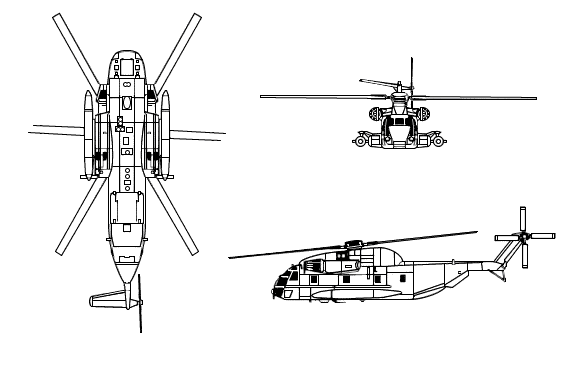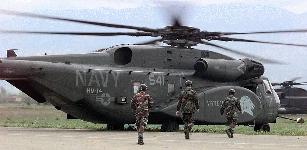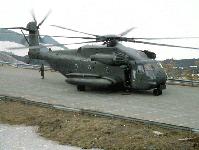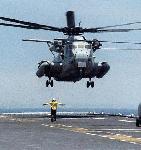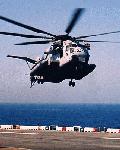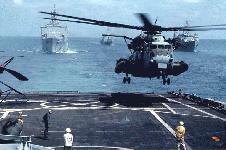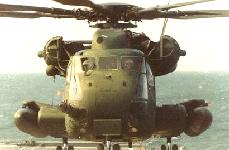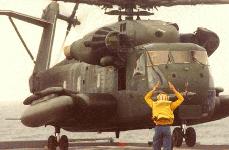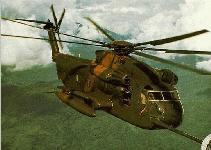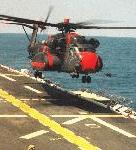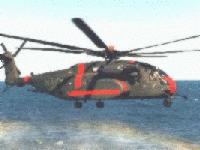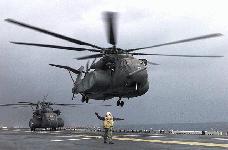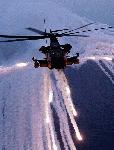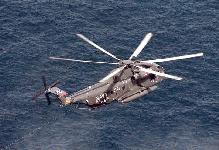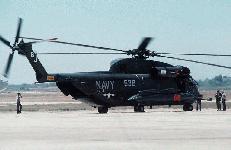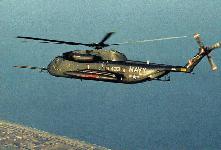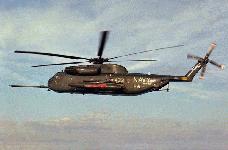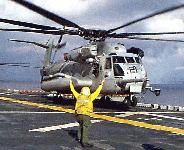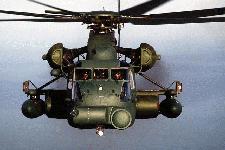 The MH-53J's mission is to perform low-level, long-range, undetected penetration into denied areas, day or night, in adverse weather, for infiltration, exfiltration and resupply of special operations forces.
The MH-53J's mission is to perform low-level, long-range, undetected penetration into denied areas, day or night, in adverse weather, for infiltration, exfiltration and resupply of special operations forces.



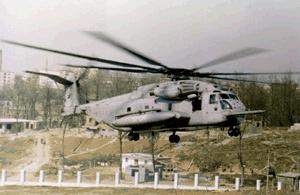 The CH-53D Sea Stallion is designed for the transportation of equipment, supplies and personnel during the assault phase of an amphibious operation and subsequent operations ashore. Capable of both internal and external transport of supplies, the CH-53D is shipboard compatible and capable of operation in adverse weather conditions both day and night. The CH-53D is now filling a role in the Marine Corps' medium lift helicopter fleet.
The twin-engine helicopter is capable of lifting 7 tons (6.35 metric tons). Improvements to the aircraft include an elastomeric rotor head, external range extension fuel tanks, crashworthy fuel cells, ARC-182 radios, and defensive electronic countermeasure equipment. The helicopter will carry 37 passengers in its normal configuration and 55 passengers with centerline seats installed.
The CH-53D Sea Stallion is designed for the transportation of equipment, supplies and personnel during the assault phase of an amphibious operation and subsequent operations ashore. Capable of both internal and external transport of supplies, the CH-53D is shipboard compatible and capable of operation in adverse weather conditions both day and night. The CH-53D is now filling a role in the Marine Corps' medium lift helicopter fleet.
The twin-engine helicopter is capable of lifting 7 tons (6.35 metric tons). Improvements to the aircraft include an elastomeric rotor head, external range extension fuel tanks, crashworthy fuel cells, ARC-182 radios, and defensive electronic countermeasure equipment. The helicopter will carry 37 passengers in its normal configuration and 55 passengers with centerline seats installed.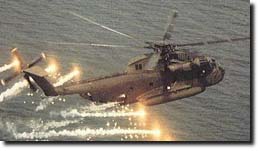 The CH-53E, the Marine Corps' heavy lift helicopter designed for the transportation of material and supplies, is compatible with most amphibious class ships and is carried routinely aboard LHA (Landing, Helicopter, Assault: an amphibious assault ship), LPH (Landing Platform, Helicopter: an amphibious assault ship) and now LHD (Landing, Helicopter, Dock: an amphibious assault ship) type ships. The helicopter is capable of lifting 16 tons (14.5 metric tons) at sea level, transporting the load 50 nautical miles (57.5 miles) and returning. A typical load would be a 16,000 pound (7264 kilogram) M198 howitzer or a 26,000 pound (11,804 kilogram) Light Armored Vehicle. The aircraft also can retrieve downed aircraft including another CH-53E. The 53E is equipped with a refueling probe and can be refueled in flight giving the helicopter indefinite range.
The CH-53E, the Marine Corps' heavy lift helicopter designed for the transportation of material and supplies, is compatible with most amphibious class ships and is carried routinely aboard LHA (Landing, Helicopter, Assault: an amphibious assault ship), LPH (Landing Platform, Helicopter: an amphibious assault ship) and now LHD (Landing, Helicopter, Dock: an amphibious assault ship) type ships. The helicopter is capable of lifting 16 tons (14.5 metric tons) at sea level, transporting the load 50 nautical miles (57.5 miles) and returning. A typical load would be a 16,000 pound (7264 kilogram) M198 howitzer or a 26,000 pound (11,804 kilogram) Light Armored Vehicle. The aircraft also can retrieve downed aircraft including another CH-53E. The 53E is equipped with a refueling probe and can be refueled in flight giving the helicopter indefinite range. Derived from an engineering change proposal to the twin-engine CH-53D helicopter, the CH-53E has consistently proven its worth to the Fleet commanders with its versatility and range. With four and one half hours' endurance, the Super Stallion can move more equipment over rugged terrain in bad weather and at night. During Operation Eastern Exit two CH-53Es launched from amphibious ships and flew 463 nautical miles (532.45 miles) at night, refueling twice enroute, to rescue American and foreign allies from the American Embassy in the civil war-torn capital of Mogadishu, Somalia in January of 1990. Two CH-53Es rescued Air Force Capt. Scott O'Grady in Bosnia in June 1995.
From FY 1996 through FY 1997, a Service Life Assessment Program (SLAP) was conducted to develop usage and fatigue life profile, and an Integrated Mechanical Diagnostic (IMD) system for the H-53E. FY 1998 Service Life Extension Program (SLEP) begins to correct deficiencies in aircraft dynamic components and mission systems. The effort will increase reliability, maintainability, and safety while reducing the cost of ownership. The Marine Corps Aviation Plan shows the CH-53D remaining in service through 2015. Therefore a Service Life Assessment Program (SLAP) must be conducted in order to ascertain what actions must be taken to safely operate the aircraft until it is replaced by the MV-22. The results of these efforts will be used to justify APN-5 funding of a SLEP for the CH-53D if warranted. FY 99 funding is also utilized for Phase II of the CH-53E SLEP.
MH-53E Sea Dragon
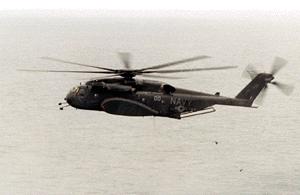 The newest military version of Sikorsky's H-53E/S80 series, the MH-53E Sea Dragon, is the Western world's largest helicopter. The MH-53E is used primarily for Airborne Mine Countermeasures (AMCM), with a secondary mission of shipboard delivery. Additional mission capabilities include air-to-air refueling, hover
in-flight refueling, search and rescue, and external cargo transport operations, in both
land and seaborne environments. The MH-53E was derived from the CH-53E Super Stallion and is heavier and has a
greater fuel capacity than its ancestor. The MH-53s can operate from carriers and other warships. Sea Dragon is capable of carrying up to 55 troops or a
16-ton payload 50 nautical miles or a 10-ton payload
500 nautical miles. The MH-53E is capable of towing a variety of mine-sweeping countermeasures systems, including the Mk 105 minesweeping sleed,
the ASQ-14 side-scan sonar, and the Mk 103 mechanical minesweeping system.
The newest military version of Sikorsky's H-53E/S80 series, the MH-53E Sea Dragon, is the Western world's largest helicopter. The MH-53E is used primarily for Airborne Mine Countermeasures (AMCM), with a secondary mission of shipboard delivery. Additional mission capabilities include air-to-air refueling, hover
in-flight refueling, search and rescue, and external cargo transport operations, in both
land and seaborne environments. The MH-53E was derived from the CH-53E Super Stallion and is heavier and has a
greater fuel capacity than its ancestor. The MH-53s can operate from carriers and other warships. Sea Dragon is capable of carrying up to 55 troops or a
16-ton payload 50 nautical miles or a 10-ton payload
500 nautical miles. The MH-53E is capable of towing a variety of mine-sweeping countermeasures systems, including the Mk 105 minesweeping sleed,
the ASQ-14 side-scan sonar, and the Mk 103 mechanical minesweeping system.
 The MH-53J's mission is to perform low-level, long-range, undetected penetration into denied areas, day or night, in adverse weather, for infiltration, exfiltration and resupply of special operations forces.
The MH-53J's mission is to perform low-level, long-range, undetected penetration into denied areas, day or night, in adverse weather, for infiltration, exfiltration and resupply of special operations forces.
The MH-53J Pave Low III heavy-lift helicopter is the largest and most powerful helicopter in the Air Force inventory, and the most technologically advanced helicopter in the world. Its terrain-following, terrain-avoidance radar and forward-looking infrare d sensor, along with a projected map display, enable the crew to follow terrain contours and avoid obstacles, making low-level penetration possible.
The helicopter is equipped with armor plating, and a combination of three 7.62mm miniguns or .50 caliber machine guns. It can transport 38 troops or 14 litters and has an external cargo hook with a 20,000-pound (9,000-kilogram) capacity.
The MH-53J has twin turbo-shaft engines; self-lubricating, all-metal main and tail rotors; and a large horizontal stabilizer on the tail rotor pylon's right side.
The MH-53J Pave Low is a modified version of the HH-53 Super Jolly Green Giant helicopter used extensively during the Vietnam War for special operations and rescue of combat personnel. During past space programs, the HH-53 was on duty at the launch site as the primary astronaut recovery vehicle. Under the Air Force's Pave Low IIIE program, nine MH-53H's and 32 HH-53s were modified for night and adverse weather operations and designated MH-53J's. Their modifications included forward-looking infrared, iner tial global positioning system, Doppler navigation systems, a terrain-following and terrain-avoidance radar, an on-board computer and integrated avionics to enable precise navigation to and from target areas.
MH-53J's were used in a variety of missions during Desert Storm. Pave Lows were among the first aircraft into Iraq when they led Army AH-64 Apaches to destroy Iraqi early warning radars and opened a hole in enemy air defenses for the opening air armada. In addition to infiltration, exfiltration and resupply of special forces teams throughout Iraq and Kuwait, Pave Lows provided search and rescue coverage for coalition air forces in Iraq, Saudi Arabia, Kuwait, Turkey and the Persian Gulf.
An MH-53J made the first successful combat recovery of a downed pilot in Desert Storm. Following the war, MH-53J's were deployed to Northern Iraq to support Operation Provide Comfort, assisting displaced Kurds. Pave Lows were also used extensively during Operation Just Cause in Panama.
Unit cost: $25 million (1993 dollars)
Crew: Two officers (pilots); four enlisted (two flight engineers, two aerial gunners)
Date Deployed: 1981
Inventory: Active force, 41; ANG, 0; Reserve, 0
| H-53 AIRCRAFT
DESCRIPTION: [CH-53E] | [MH-53E] CH-53E Sea Stallion Contractor: Sikorsky Aircraft (Prime), General Electric (Engines) Airframe:
Power Plant:
Performance:
Countermeasures:
Mission and Capabilities:
Program Summary:
MH-53E Sea Dragon Airframe:
Engines:
Performance:
Countermeasures: Not applicable Missions and Capabilities:
Program Summary:
MH/CH-53 TECHNICAL DATA: External Dimensions
Areas
Weights and Loadings
Performance :
|
||||||||||||||||||||||||||||||||||||||||||||||||||||||||||||||||||||||||
